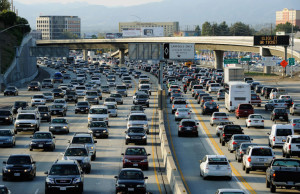In case you missed it just last week on Thursday June 23rd, the Los Angeles County Metropolitan Transportation Authority (Metro) Board, voted to place a very transformative transportation plan measure that puts a half cent sales tax, with no sunset clause, on the November ballot. In 2015, Metro’s staff conducted several public opinion surveys outlining research that showed participants agreed that congestion had gotten significantly worse, expressed support for the proposed measure, and that this ballot measure was the Board’s answer. Angelenos will now need to consider extending the life of the 2008 Measure R, which would result in another $860 million dollars per year to enhance mobility and quality of life in Los Angeles. Like Measure R, the new ballot measure would fund an ambitious expansion of Metro’s rail network, widen congested freeways, increase transit operations, and maintain streets. However, the new measure adds new categories of funding that were left out of the 2008 Measure R, including increased funding for state of good repair, a new bus rapid transit program, paratransit and regional active transportation. The categories would-be governed by a new expenditure plan.
Over the past year, the Coalition for Clean Air provided input and collaborated with a wide range of stakeholders, initiating a planning process to provide support for equitable planning. This encouraged Metro’s Board to adopt highway and performance measures with a broad range of performance metrics including mobility, accessibility, safety, economy and quality of life – along with indicators to measure and evaluate projects and secure funding for a balanced transportation investment. Measure R had not invested in those areas previously. As written now, the potential ballot measure promises to bring much needed improvement in the way we navigate Los Angeles County.
Metro has considered completion of critical goods movement projects and recommended that the I-710 South freeway include two zero emission truck lanes. Hold your applause because we continue to fall short in the creation of a revenue stream for deployment of zero emission vehicles and ending the diesel agenda in the goods movement sector. However, there continue to be safety and public health issues associated with this industry. Heavy-duty trucks are a significant source of traffic congestion and safety concerns on our freeways, a significant source of air pollution in freeway adjacent communities, and one of our most significant sources of greenhouse gas emissions. Diesel emissions, the most toxic of all air contaminants, are a major cause of lung cancer, asthma, heart disease and other health problems and will not significantly improve unless we make investments in goods movement and move the sector beyond demonstration projects. While the Metro Board’s intent was to serve the region to improve efficiency and safety, they have failed in addressing freight as the largest polluter in the transportation sector. The total amount of resources allocated to goods movement is, on its own, not sufficient to achieve the goal of fully deploying these technologies. Comprehensive doesn’t always mean holistic, and while new investments will address economic, environmental and health concerns in the region, we are still lacking the deployment of zero-emission technology to improve the quality of life of Los Angeles. Deployment of this technology should serve the region to improve efficiency and safety, thus reducing air pollution and emissions from greenhouse gases.
As the ballot measure process continues, Metro will continue to hear from us, and we will need to continue to work with them to better align polices related transportation with regional and state goals for climate, health and equity.
[share title=”Share This Post”]








